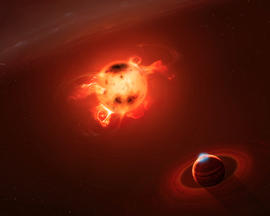The origins of hot Jupiters Louise Yu
le 01 déc 2017 de11h00à 13h002017/12/01 2017/12/01

How do planetary systems form? Ever since the search for exoplanets started more than twenty years ago, over 3000 exoplanets have been detected, with a diversity going far beyond that of our own solar system. Among them, hot Jupiters, planets as massive as Jupiter or more, but orbiting their star very closely, are a key to understanding how planets form and migrate in their early years (or rather, early millennia). Indeed, models show that such massive planets have formed far from their star and then migrated inwards, impacting on the global choreography of the planetary system through their important gravitational influence. In order to discover the mechanisms leading to this migration, we observe sun-like stars that are at the beginning of their life, only a few million years old, look for exoplanets around them and study their characteristics. This seminar will elaborate on planet migration, on some exoplanet detection techniques, in particular around young sun-like stars, and on some recent results and future prospects.




